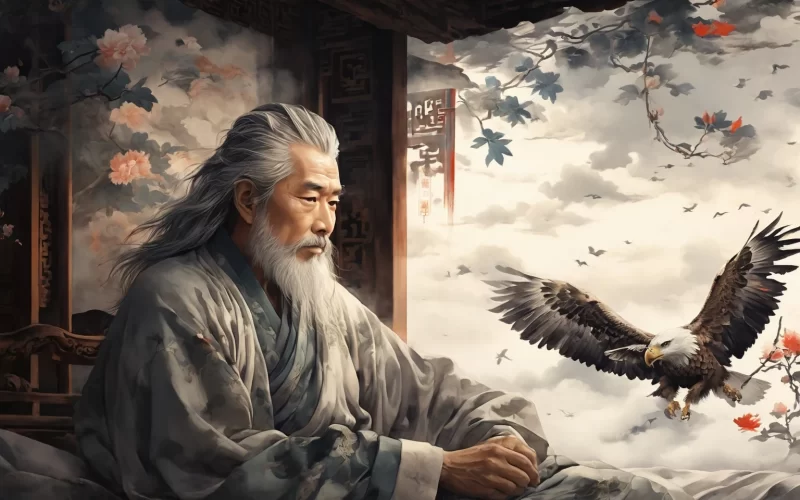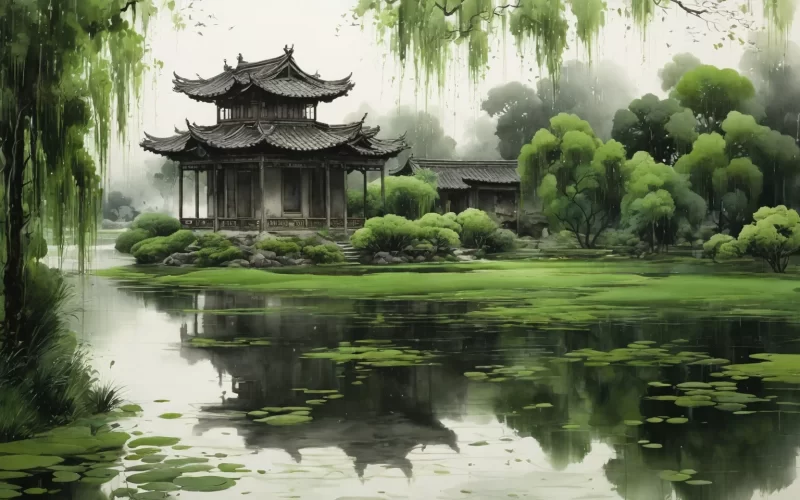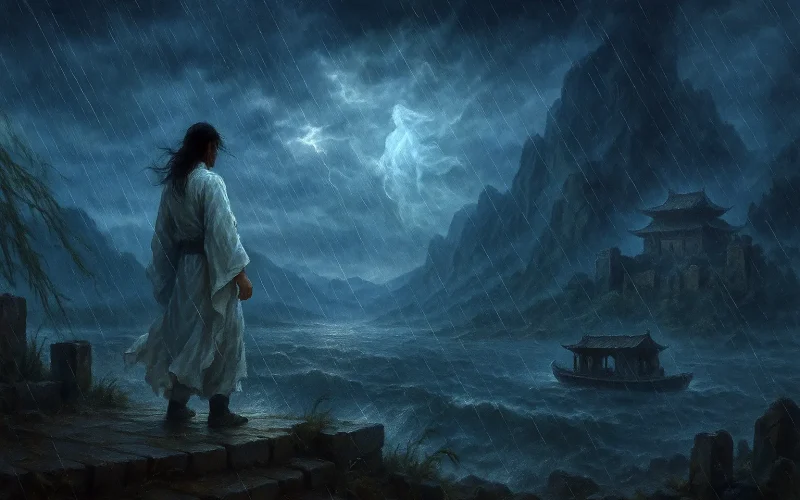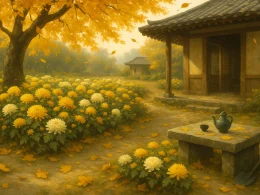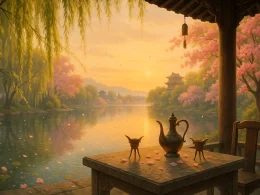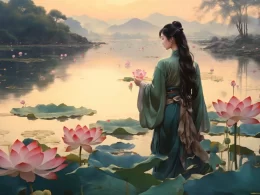The roc flew up and shook the earthly world;
Halfway in heaven he fell, his pinions furl’d.
His wings still stir the wind for ages long;
He hangs his left sleeve on the sun-rising tree.
If people hear this song when I am gone,
Who will weep over my fall as for the sage’s death?
Original Poem
「临终歌」
李白
大鹏飞兮振八裔,中天摧兮力不济。
馀风激兮万世,游扶桑兮挂左袂。
后人得之传此,仲尼亡兮谁为出涕。
Interpretation
Composed around 762 CE near the end of Li Bai's life, this poem is widely regarded as his poetic epitaph. Throughout his career, Li Bai identified with the mythical roc (大鹏), from his youthful "Rhapsody of the Great Roc" to this final work where the imagery reaches its ultimate expression. The roc symbolizes his ideal persona—transcending worldly constraints and soaring to celestial heights. Yet here, the roc "breaks mid-heaven"; its lament transcends personal fate to reveal the tragic conflict between genius and era.
First Couplet: "大鹏飞兮振八裔,中天摧兮力不济。"
Dàpéng fēi xī zhèn bā yì, zhōngtiān cuī xī lì bù jì.
The great roc soars, its wings shaking the eight horizons; Mid-heaven it breaks, its strength failing.
These lines move from majestic triumph to profound despair. "Shaking the eight horizons" encapsulates his life's impact—from having Emperor Xuanzong descend from his palanquin to greet him, to commanding respect from the powerful, to his poetic fame resonating across the land. "Mid-heaven" represents both his zenith and the beginning of his tragedy. "Breaks" conveys his political collapse (as with his involvement in Prince Li Lin's revolt) and his dying vitality. "Strength failing" is not an admission of inadequacy but a poignant indictment of merciless fate and an intolerant era, full of an idealist's despair when confronted with reality.
Second Couplet: "馀风激兮万世,游扶桑兮挂左袂。"
Yú fēng jī xī wànshì, yóu fúsāng xī guà zuǒ mèi.
Its lingering winds will stir ten thousand ages; Journeying to the Fusang tree, my left sleeve catches.
The couplet shifts from elegy to prophecy. "Lingering winds will stir ten thousand ages" affirms his conviction that his spirit and literary legacy will resonate eternally, echoing Du Fu's assessment that "when his brush falls, it astounds wind and rain; his completed poems make ghosts and gods weep." "Journeying to the Fusang tree" - the mythical eastern locus of the sunrise - serves as a metaphor for the pursuit of ultimate ideals, while "my left sleeve catches" becomes a profoundly tragic detail: it suggests not the roc's lack of power, but that the cosmos, however vast, proves insufficient for its full flight. The sleeve, symbolizing its soaring posture, is snagged by the tree representing light. This imagery expresses a lifetime of constraints with both romanticism and deep sorrow.
Third Couplet: "后人得之传此,仲尼亡兮谁为出涕。"
Hòurén dé zhī chuán cǐ, Zhòngní wáng xī shuí wèi chū tì.
Posterity will learn of this and pass it down; But Confucius is gone—who will shed tears for me?
The concluding couplet balances defiance with profound solitude. The declaration that "posterity will learn of this and pass it down" asserts the poet's unwavering confidence in his enduring legacy. Yet the allusion to Confucius grieving over a captured lin - a mythical auspicious creature whose untimely appearance foretold misfortune - reveals deeper anguish: like this misjudged celestial beast, Li Bai finds his genius, ideals, and ultimate tragedy fundamentally misunderstood in his own time. He anticipates posthumous acclaim but laments the absence of contemporary understanding. This final rhetorical question elevates personal misfortune to the realm of existential solitude.
Holistic Appreciation
The Song of the Final Journeyunfolds as a tragic symphony woven from heroic ambition and profound despair—a poetic testament inscribed with life itself. The poem traces the complete trajectory of Li Bai's idealized persona: from transcendent flight to cataclysmic rupture at the zenith of heaven, culminating in spiritual legacy. It commences with earth-shaking ascension and concludes in misunderstood tears, its architecture taut yet energetically continuous. The work resonates with immense tension: the roc's majestic grandeur juxtaposed against the devastating rupture at heaven's midpoint; the boundless reach of "lingering winds across ten thousand ages" contrasted with the solitary silence of unmourned departure. This dynamic opposition mirrors Li Bai's own existence—a life of glorious rebellion culminating in worldly defeat. More than merely a self-composed elegy, the poem stands as a transcendent tribute and lament for all great souls born out of synchronization with their era, their ambitions forever unfulfilled.
Artistic Merits
- Symbolic Culmination: The roc imagery evolves from an early symbol of pure freedom into a complex emblem integrating majesty, tragedy, and immortal spirit, completing the ultimate shaping of Li Bai's self-artistic image.
- Fusion of Romanticism and Tragic Beauty: The poem masterfully integrates mythical elements (the roc, Fusang tree) with vast spatiotemporal scales ("eight horizons," "ten thousand ages") and the poet's own harsh fate, unleashing profound tragic power through heightened romantic imagination.
- Profound and Contrastive Use of Allusion: The reference to "Confucius weeping for the lin" transcends conventional tropes of unrecognized talent to articulate the pain of a missing ultimate understanding, using ancient wisdom to highlight present solitude.
- Effective Use of Chu Ci Style: The "xi" (兮) particle inherits the lament and exuberance of the "Songs of Chu," its rhythm both passionate and halting, perfectly suited to these turbulent, deeply restrained final emotions.
Insights
The poem's impact far exceeds simple sympathy for "unrecognized genius." It prompts contemplation of the eternal conflict between an unbounded spirit and a constrained world. Li Bai's value lies not in achieving political ambitions but in demonstrating the ultimate reach of human spirit through his pure vitality and creative genius, which shattered all mediocrity. His "failure"恰恰成就 his literary eternity. This enlightens us that life's value may reside not in attaining worldly goals but in whether, during the pursuit, we strove with full power—like the roc shaking the horizons—leaving behind a legacy that stirs the ages.
About the poet

Li Bai (李白), 701 - 762 A.D., whose ancestral home was in Gansu, was preceded by Li Guang, a general of the Han Dynasty. Tang poetry is one of the brightest constellations in the history of Chinese literature, and one of the brightest stars is Li Bai.






